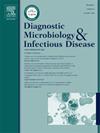High in vitro activity of Fosfomycin in carbapenemase-producing Klebsiella pneumoniae and carbapenem-resistant Pseudomonas aeruginosa in clinical isolates in Colombia
IF 1.8
4区 医学
Q3 INFECTIOUS DISEASES
Diagnostic microbiology and infectious disease
Pub Date : 2025-09-13
DOI:10.1016/j.diagmicrobio.2025.117110
引用次数: 0
Abstract
Objectives
We report the fosfomycin resistance rates in clinical isolates of carbapenemase-producing K. pneumoniae (CPKP) and carbapenem-resistant P. aeruginosa (CRPA) in Colombia, as well as the characterization of mechanisms of resistance to fosfomycin.
Methods
CPKP (n = 130) and CRPA (n = 170) isolates were collected from 12 Colombian hospitals between 2018 and 2022. Fosfomycin susceptibility testing was performed by agar dilution. Analysis of the MurA, GlpT, UhpT, UhpA, PtsI and CyaA were performed in all fosfomycin-resistant isolates using WGS.
Results
Minimal inhibitory concentrations below the ECOFFs were detected in 97,8 % isolates. Among the 5 fosfomycin-resistant CPKP, all isolates harbored a mutation in the MurA protein (Tyr287Asn) and a substitution (Gly171Arg) in the UhpT. 60 % fosfomycin-resistant CPKP had the Ile91Val mutation associated with the FosAKPN, one isolate showed a substitution in the GlpT protein (Tyr141Cys), and one isolate displayed a premature stop codon of the GlpT (ES86). No mutations were found in GlpR, PtsI, or CyaA in CPKP resistant to fosfomycin. One fosfomycin-resistant CRPA isolate was identified, showing a deletion of 6 bp in glpT, as well as other mutation in the same gene, leading to the Gly422Ser substitution.
Conclusions
for CRPA and particularly, for CPKP resistant to fosfomycin, there is a diversity in their resistance mechanisms with mutations in the MurA as the prevalent mechanism in CPKP. Also, FosAKPN and GlpT mutations were identified as the other mechanisms of fosfomycin resistance in these clinical isolates. Fosfomycin can be considered a therapeutic option in combination therapy to treat CPKP and CRPA in Colombia.
磷霉素对哥伦比亚产碳青霉烯酶肺炎克雷伯菌和耐碳青霉烯假单胞菌的体外高活性研究
目的:报道哥伦比亚产碳青霉烯酶肺炎克雷伯菌(CPKP)和耐碳青霉烯铜绿假单胞菌(CRPA)临床分离株的磷霉素耐药率,以及对磷霉素耐药机制的表征。方法:2018 - 2022年在哥伦比亚12家医院采集CPKP (n = 130)和CRPA (n = 170)分离株。采用琼脂稀释法进行磷霉素药敏试验。采用WGS法分析所有耐磷菌株的MurA、GlpT、UhpT、UhpA、PtsI和CyaA。结果:97,8 %的菌株检测到最低抑菌浓度低于ecoff。在5个耐磷菌素CPKP中,所有分离株都含有MurA蛋白(Tyr287Asn)突变和UhpT的替换(Gly171Arg)。60%的CPKP具有与FosAKPN相关的Ile91Val突变,一个分离物显示GlpT蛋白的替换(Tyr141Cys),一个分离物显示GlpT的过早停止密码子(ES86)。在对磷霉素耐药的CPKP中未发现GlpR、PtsI或CyaA突变。鉴定出一个耐磷霉素的CRPA分离物,显示glpT缺失6 bp,以及同一基因的其他突变,导致Gly422Ser取代。结论:对于CRPA,特别是对磷霉素耐药的CPKP,其耐药机制存在多样性,MurA突变是CPKP的普遍机制。此外,FosAKPN和GlpT突变被确定为这些临床分离株中磷霉素耐药的其他机制。在哥伦比亚,磷霉素可作为联合治疗CPKP和CRPA的一种治疗选择。
本文章由计算机程序翻译,如有差异,请以英文原文为准。
求助全文
约1分钟内获得全文
求助全文
来源期刊
CiteScore
5.30
自引率
3.40%
发文量
149
审稿时长
56 days
期刊介绍:
Diagnostic Microbiology and Infectious Disease keeps you informed of the latest developments in clinical microbiology and the diagnosis and treatment of infectious diseases. Packed with rigorously peer-reviewed articles and studies in bacteriology, immunology, immunoserology, infectious diseases, mycology, parasitology, and virology, the journal examines new procedures, unusual cases, controversial issues, and important new literature. Diagnostic Microbiology and Infectious Disease distinguished independent editorial board, consisting of experts from many medical specialties, ensures you extensive and authoritative coverage.

 求助内容:
求助内容: 应助结果提醒方式:
应助结果提醒方式:


